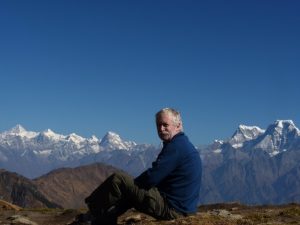
12 Jul Alumni Spotlight – Stephen Alter ’74

Stephen Alter is an author of both fiction and non-fiction. He has received the Guggenheim Fellowship for Creative Arts, US & Canada, 2002-03 for his book Elephas Maximus. He worked as the director of the writing program at the American University in Cairo and was a writer-in-residence at the Massachusetts Institute of Technology in Cambridge. He was also the organizer of the Mussoorie International Writers’ Festival which began in 2007.
What is your favorite Woodstock memory?
One of my favorite memories of Woodstock is the “Fair Weather Holidays” we would get during the monsoon. Once a year, if there were no clouds in the sky by the time the first bell rang, then everyone was let out of school to go on day hikes or to the bazaar. It was a wonderful tradition that made gloomy, wet days in August full of anticipation for a sunlit escape outdoors.
Is it challenging to write about both non-fiction and fiction?
Moving back and forth between non-fiction and fiction is a good pattern for me because each genre has its own specific demands. Having just finished a big non-fiction book, Wild Himalaya: A Natural History of the Greatest Mountain Range on Earth, which involved more than three years of research and travel, I am now waist-deep in a new novel and it’s wonderful to be able to wade into a book with only your imagination to guide you and keep you afloat.
Did your experience as a professor influence your writing?
Teaching complements writing because it involves conversation and collaboration with students or colleagues, whereas writing is a fairly lonely business, sitting by yourself and staring at a laptop screen. Most importantly, though, I found that when I started teaching I began to learn much more than I ever did when I was a student. My real education commenced long after college when I had to stand at the front of a classroom for the first time and pretend that I knew what I was talking about.
Was there anyone or anything at Woodstock that motivated you to become an author?
My mother, who taught English at Woodstock, was the person who inspired me to write when I was still in school. There were other teachers too, of course, but she was the one who first taught me the importance of putting words on a page.
The cover of your book All The Way to Heaven is of Woodstock School and in the book, you mention many memories of your time at Woodstock. What inspired you to write this book?
Initially, I began writing this memoir only because an editor insisted that I should do so (and offered me some money as an advance, which is always a great boost for the imagination.) However, after I was halfway through the first draft, I realised that there were a lot of stories to tell about Woodstock and Landour. The book presents a personal perspective on that particular time and place but it has been gratifying that not too many people have disagreed with my memories.
Is there anything you’d like to share with the Woodstock community? Words or advice or any experiences?
Giving advice is always a bad idea, especially within the Woodstock community, unless it’s very specific, like: “You must visit the Jabarkhet Nature Reserve if you are in Mussoorie!” (In fact, that’s best I can do.)
Are you still in contact with your classmates?
Yes, I’m just about to attend my class’s 45th reunion in Minneapolis. Living in Mussoorie, Ameeta and I are fortunate to meet a number of classmates who come back to the school for visits from time to time. It’s always a pleasure to meet friends from Woodstock and reconnect.
Did Woodstock prepare you for life “in the real world”?
Yes and no. I think Woodstock taught us to accept others, even if they have different perspectives, personal histories or beliefs, though there has always been a certain tension within that shared experience of diversity. On the other hand, the insular sense of security and support that I experienced at Woodstock made the transition to college and then hustling stories for a living somewhat more of a challenge, especially when it came to facing rejection, which is a major part of being a writer.
You have recently taken over as the Chair of the newly formed Development Advisory Council to work closely with the Development Office, how has that experience been?
Chairing the Development Advisory Council gives me a wonderful opportunity to work with Arjun Puri, Director of Development, and a very committed group of Woodstock alumni, parents and friends, who want to help raise funds for the school. While the new principal, Dr. Craig Cook, and the Woodstock Board will be setting the course for the school, our job is to develop strategies to solicit financial support for new initiatives, especially from within India.
Your father, Rev. Robert Alter (Class of 43) played such an integral role in the history of Woodstock, what are your memories of him at the school?
My father and mother shared a deep commitment to Woodstock and believed that change was essential for the school in the 1960s and ’70s, as it went from being a missionary institution to becoming an international school. Though they took that challenge very seriously, I think they also enjoyed themselves immensely while working at Woodstock, almost as if it were a continuous theatrical production that lasted for the ten years. Both my parents loved drama, and their tenure at the school was like a medley of Shakespeare’s The Tempest (or Much Ado About Nothing), Gilbert and Sullivan’s, Trial by Jury and Samuel Beckett’s Waiting For Godot.
If Woodstock had a professional networking platform when you were at school, would you have used it?
When I was in school the only platforms we had were the risers on Parker Hall stage, but today I think that alumni would benefit from professional networking within the community. It’s always good to know that when you start looking for a new job there are others out there who understand where you’re coming from.
How significant a role should alumni play in shaping the future of current Woodstock students?
Alumni have many critical roles to play at Woodstock and one of the ways in which they can contribute is to make themselves available as mentors for recent graduates, or by simply offering a sympathetic ear on the other end of a phone call.






Jackson Day
Posted at 05:38h, 14 JulyWonderful picture, great interview.
Dorothy Yoder Nyce
Posted at 20:48h, 02 DecemberHello, Stephen, John and I have been reading your books since first knowing of you at Woodstock back in the ’60s. He just finished reading your most informative Wild Himalaya. When I started reading it yesterday, I was intrigued when in the “Prologue: Oakville” (which home I visited years ago when your mother Ellen invited me for tea) you mentioned Hannah Marshman, wife of Henry Havelock and his link to your Oakville home.. My link: a few years ago I had researched for a published article Henry Martyn British missionary to India in the early 1800s. He wrote of Hannah Marshman along with her husband Joshua, W. Carey and W Ward, That reference in turn took me to my book shelves to find the book titled Hannah Marshman The first woman missionary in India by Sunil Kumar Chatterjee. That Hannah was the mother of the Hannah who married Havelock; what interesting links!.
Therefore this note to alert you to how your fine writing leads us as readers to further insight into the India with which many of us are attached in diverse ways.
Do continue to write! Dorothy Yoder Nyce